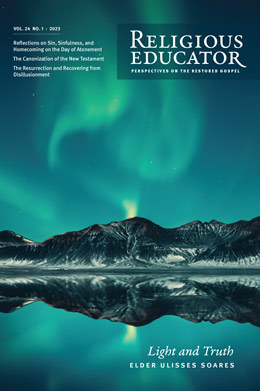Reflections on Sin, Sinfulness, and Homecoming on the Day of the Atonement
John S. Tanner
John S. Tanner, "Reflections on Sin, Sinfulness, and Homecoming on the Day of the Atonement," Religious Educator 24, no. 1 (2023): 12–15.
John S. Tanner (jstanner70@gmail.com) is recently retired; he was formerly president of BYU–Hawaii and academic vice president of BYU.
 As Latter-day Saints, we believe that Christ's Atonement makes possible our spiritual homecoming by cleansing us from sin through the blood of Christ and sanctifying our fallen, sinful natures. Photo by Paul Seling, Pexels.com.
As Latter-day Saints, we believe that Christ's Atonement makes possible our spiritual homecoming by cleansing us from sin through the blood of Christ and sanctifying our fallen, sinful natures. Photo by Paul Seling, Pexels.com.
Two years ago I was privileged to spend Yom Kippur, the Day of Atonement, in Israel. I flew to Israel via New York seated by an orthodox Jew. He was making an annual pilgrimage to his spiritual home for this most sacred High Holy Day, which began at sundown the day we arrived. I spent the flight and much of the next day thinking about how atonement and homecoming were connected for me, as well as about sin and sinfulness. As a Latter-day Saint, I believe that Christ’s Atonement makes possible our spiritual homecoming by cleansing us from sin through the blood of Christ and sanctifying our fallen, sinful natures.
In the Church we seem reluctant to talk about sin. Typically, we speak in euphemisms that reduce sin to “mistakes,” “errors,” “weaknesses,” “faults,” “slipups,” and the like. When we do actually speak about sin, it is in reference to discrete transgressions—as if the problem is merely our individual sins. Rarely do we speak about our sinfulness at all.
But what needs fixing goes beyond mistakes and errors. It goes beyond even our individual sins. What we need to get right with God is deeper than this. Gratefully, so is the reach and power of the “at-one-ment” that Christ makes possible.
Christ not only forgives sins, he is able to root out sinfulness and free us from its bondage. He not only blots out specific stains and impurities, he heals our brokenness and makes us whole. His Atonement not only satisfies the demands of justice, it redeems our fallen natures.
In these ways Christ’s Atonement fits us for a heavenly homecoming—for the day when we will stand before the Savior as our judge and he, paradoxically, promises to stand beside us as our advocate, “saying: Father, behold the sufferings and death of him who did no sin, in whom thou wast well pleased; behold the blood of thy Son. . . . Wherefore, Father, spare these my brethren that believe on my name” (see Doctrine and Covenants 45:3–5). As Paul says, having such an High Priest intercede for us gives us “boldness to enter into the holiest [of holies] by the blood of Jesus, by a new and living way . . . through the veil, that is to say, his flesh” (Hebrews 10:19–20).
When I went to Israel, I, along with the rest of the Church, had been studying Paul’s epistles. Paul was deeply aware of the bondage of sin. In Romans he cries out, “O wretched man that I am!” (Romans 7:24). Nephi utters the same anguished cry (see 2 Nephi 4:17). Both great prophets were troubled not simply by their specific sins but by the bondage of sin that held them in its awful thrall. Nephi laments that he is “easily beset” by sin and temptation (2 Nephi 4:18). Paul grieves for the “sin that dwelleth in me” (Romans 7:20) and caused him to feel at war with himself.
They and we experience sinfulness in many ways: as captivity, chains, and bondage under which “the whole world lieth” (Doctrine and Covenants 84:49) and from which we long to be freed. As defilement, impurity, and contamination from which we desire to be cleansed. As spiritual sickness, brokenness, and infirmity from which we hope to be healed and made whole. As guiltiness and culpability for which we need to be absolved. And as being lost, outcast, forsaken, and alien, which gives rise to a deep yearning for home. Tellingly, the word wretched—as in “O wretched man that I am!”—comes from the Old English for “outcast” or “exile.” As sinners, we, like Paul and Nephi, feel wretched for having strayed from and betrayed both our God and our true selves.
I am persuaded that, through the Atonement of Christ, we can and shall be freed from bondage, cleansed from impurity, healed from brokenness and made whole, redeemed from guilt, and returned to be at one with God, ultimately having no more disposition to do evil. This rarely, if ever, occurs fully in this life, but occasionally we taste such moments of grace in mortality and these feel like sweet foretastes of heaven!
The voice crying repentance that touches our hearts most deeply is a voice that seems to echo from realms where we once lived. It is a voice calling us home to our eternal identity as daughters and sons of God.
I wrote about this years ago in a poem inspired by an evocative phrase in the parable of the prodigal son: “And when he came to himself, he said, . . . I will arise and go to my father” (Luke 15:17–18). To repent is to be called home to our true self:
Thy gentle voice recalls me home
However far I stray,
It whispers in my mother tongue
When I have lost the way.
It bids my restless soul to rest
That rests in thee alone,
And calls me back unto myself
When I begin to roam.
Sin is a wandering and a mask,
A hollow vanity.
I am not made for such pretense
Since I am made for thee.
May I come back into thy grace
Where I am meant to be.
For I’m a stranger to myself
When I am far from thee.
We are made for heaven. It is our true home. The Savior stands ready to help us home. I love what Bruce C. Hafen wrote thirty years ago in a touching seminal essay entitled “Beauty for Ashes: The Atonement of Jesus Christ.” He concludes by recalling how, “as we . . . grope and move our way homeward,”
holding fast to this rod in the mists of darkness, . . . we are likely to find that the cold rod of iron will begin to feel in our hands as the warm, firm, loving hand of him who literally pulls us along the way. We find that hand strong enough to rescue us, warm enough to tell us that home is not far away; and we summon our deepest resources to reciprocate, until we are again “at one” in the arms of the Lord. (Ensign, April 1990).
When I arrived in the Holy Land, I did not feel that I had returned home. Israel is not my home. But the God of Israel is! I was grateful that this Jewish High Holy Day, with its unique traditions and sacred meaning for Jews, had prompted me, a Latter-day Saint, to reflect on a future day of atonement—a day when I no longer shall feel the familiar intonations of divine homesickness whispering, “You’re a stranger here” (Hymns, no. 292). For I shall be home again, “at one in the arms of the Lord.”
